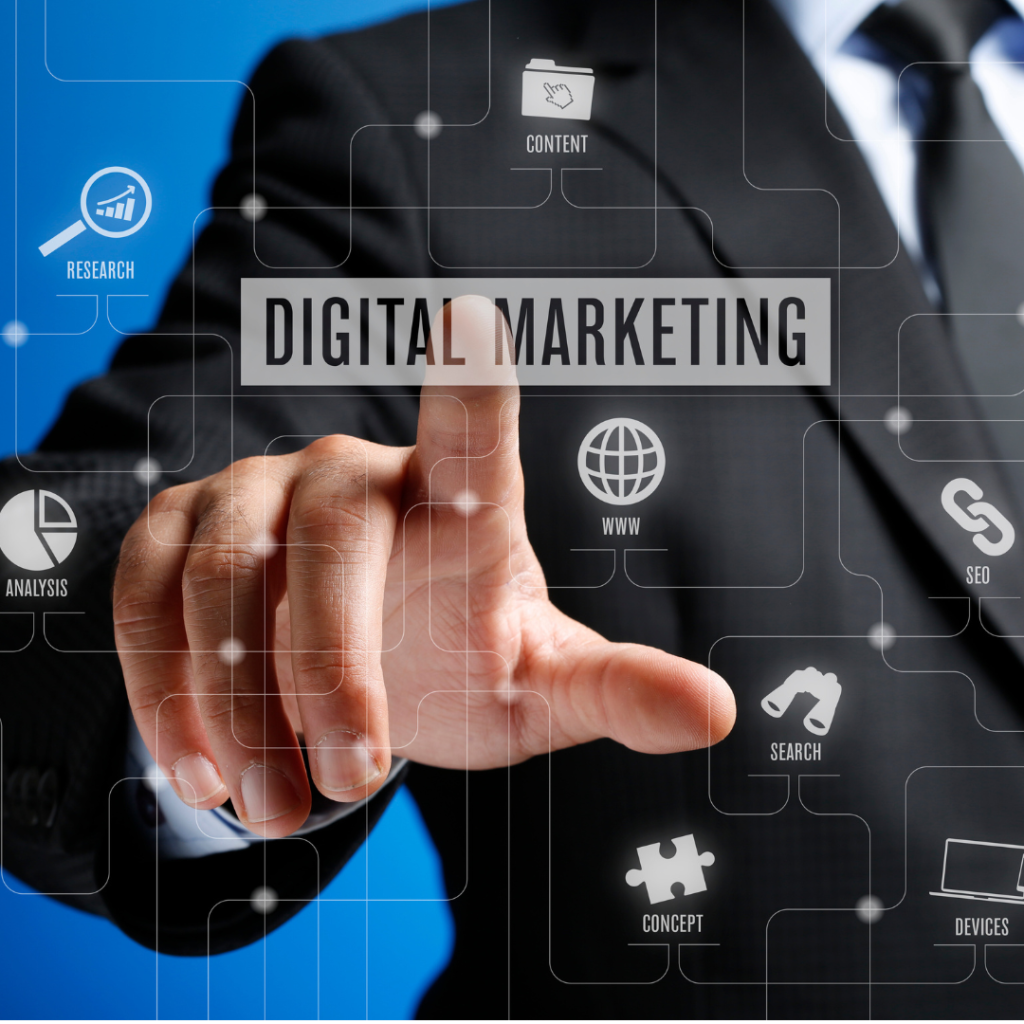Blog
Essential Elements of Digital Marketing
In today’s digital world with never-ending technology changes, continuous trends, and ever-increasing customer demand it’s never been so important to have an online presence. Your business needs to be seen and heard, and going digital is the way to do it! But what is digital marketing? And WHY is it so essential? Let’s take a digital deep dive into these questions, focusing on the fundamental components that every business should know in order to thrive.
First off….let’s define digital marketing as I get this question a lot!
In short, digital marketing is the use of online platforms (social media, websites, emails, search engines) to promote/advertise products or services. It’s highly strategic and businesses usually incorporate a variety of platforms to get the best outcome. The goal is of course to make the business a success, but the key part in that is the customer. Marketers work to find out who your customers are, where they are, and how to best engage them. There is SO much more to it but that’s the basis for now!
Now let’s have look through some of the key components and the terminology you need to know!
Search Engine Optimisation (SEO): This is the process of optimising your website and content to basically have a better chance of being seen in search engine results. There are multiple aspects of SEO, and they are equally important…but we’ll dive into that another time.
Content marketing: Creating, using, and sharing valuable content that resonates with you audience, such as blogs, videos, and social posts to name a few. The key aim here is to attract and engage your target audience but it’s crucial to offer value, and this does not always mean monetary value.
Email marketing: Creating strategic email campaigns that offer value to your customers, but also sending single emails out in the right way so they get opened and people take the desired action.
Social Media Marketing: Every platform has a different target market and purpose but what all of them have in common is that they allow you to connect with your audience, get your business out there, and drive engagement through targeted content, advertising, and community interaction.
Influencer marketing: Collaborating with influencers whether they have a moderate or eye-opening following can be incredibly valuable for your business. They already have the audience, and they know what they’re doing, but you must choose wisely and make sure that whoever you choose is compatible with your brand. Do not choose someone based on follower count…do your homework, ask questions, see if they match your vibe.
Pay-per-click-advertising (PPC): One of the many paid advertising models, but arguably the most popular. As the name suggests…you only pay when someone clicks your advert. You need an eye-catching, engaging ad that provides value and makes your audience want to see what you’re offering. Targeting is CRUCIAL. Not targeting your paid ads is the equivalent of throwing your money down the drain! (More on paid ads another time!)
Analytics: Digital Marketing would be nothing without data! When you start collecting and analysing the data from your website (on Google Analytics), your socials, your email campaigns etc, you can understand customer behaviour, optimise your strategy, and measure your success. It enables you to make data driven decisions!
Customer relationship management (CRM): There are a number of CRM tools you can use to manage and analyse customer interactions and data throughout the customer lifecycle. The aim? To personalise interactions, foster loyalty, and enhance customer satisfaction and retention.
How marketing helps your business
Wider reach: You can reach a global audience with a digital marketing strategy, finding new markets and new opportunities in the ever-evolving digital world.
Cost-effective: You don’t have to blow your budget to see results. In comparison to traditional marketing with its costly printing and limited geographical boundaries, digital marketing is the financially friendlier option. No wasted budget. No guess work. Way more possibilities at a fraction of the price…and you can monitor how effective your strategy is in real-time.
Results that speak to you: One of the best advantages of digital marketing is the ability to track and analyse your marketing in real time. You can monitor your website behaviour, conversion rates (how many people take the desired action like booking an appointment), your engagement, and much more… enabling you to make data-driven decisions and improve your strategy.
Targeted marketing: You can target whatever audience is right for your business, whether you base it on their age, location, preferences, interests, or behaviours….or anything else. Targeted marketing is so powerful and it’s arguably one the most important components! Knowing your audience is an absolute MUST.

Mastering the fundamentals of marketing is essential for any business to thrive in today’s competitive landscape. By leveraging the strategies mentioned in this blog you can create a cohesive and effective digital presence that really resonates with your target audience.
The beauty of digital marketing lies in its ability to adapt and evolve…providing you with the tools you need to reach a wider audience whilst remaining cost-effective. By using data-driven insights you can fine-tune your approach, ensuring that every decision is informed and aligned with your business goals.
As you embark on your digital journey remember that success comes from a well-planned, well-implemented, and thoroughly analysed strategy. Embrace the power of digital marketing, and don’t forget to utilise innovative technologies like AI for enhanced insights and efficiency. Doing so will enable you to watch your business grow in the best way. In this fast-paced digital age, staying visible and relevant is not just an option…it’s a necessity.
If I wrote everything there is to know about digital marketing then I’d be selling you the longest novel ever written….so stay tuned for the upcoming blogs where I’ll be diving deeper into what does what, and why it’s important. And I promise to keep jargon to a minimum. Acronyms…I can’t avoid them, they’re everywhere, sorry! (But I will define them!)